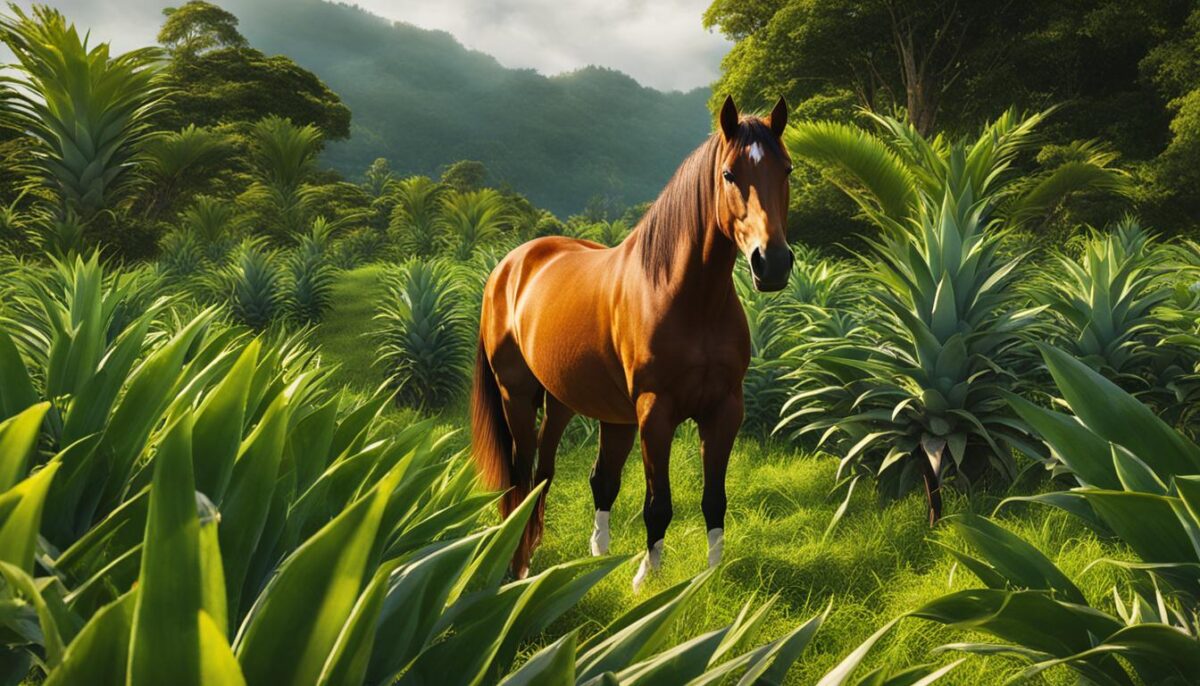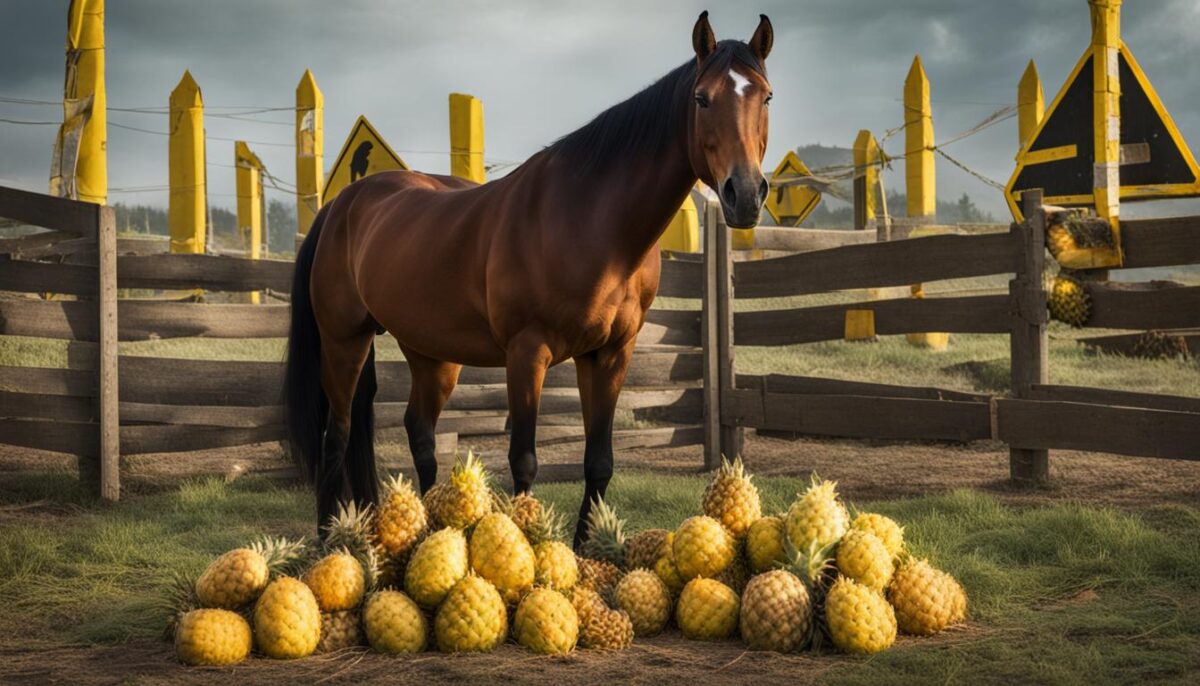Feeding your horse a well-balanced diet is essential for their health and happiness. While horses enjoy a variety of fruits and vegetables, it’s important to know which ones are safe for them to consume. In this article, we’ll explore whether horses can eat pineapple and provide some equine diet tips to ensure your horse’s well-being.
Key Takeaways:
- Pineapple is a safe and enjoyable treat for horses when fed in moderation.
- Removing the core and outer skin of pineapple is crucial to prevent choking.
- Feeding pineapple to horses can provide them with Vitamin C and other essential nutrients.
- It’s important to cut pineapple into small quarters for safe consumption.
- Other safe fruits and vegetables for horses include bananas, carrots, and apples.
Pineapple is a tropical fruit known for its sweet and tangy flavor. While many assume that it is harmful to horses, the truth is quite the opposite. Horses can safely enjoy pineapple as an occasional treat.
When feeding pineapple to horses, it’s crucial to remove the core and outer skin. The core can be tough and difficult to chew, while the skin is sharp and can cause injuries to their mouth and throat. By cutting the pineapple into small quarters, you can ensure safe and enjoyable consumption for your equine friend.
Not only is pineapple delicious to horses, but it also provides them with a good source of Vitamin C. Vitamin C is an essential nutrient that boosts the immune system and helps fight free radicals in the body. By incorporating pineapple into your horse’s diet, you can help support their overall health and well-being.
It’s important to note that while pineapple offers many benefits for horses, moderation is key. Too much pineapple can lead to digestive issues such as diarrhea, colic, and stomach cramps due to its high sugar and fiber content. To prevent any potential harm, it’s best to offer several small slices of pineapple once or twice a week.
In addition to pineapple, there are other safe fruits and vegetables that horses can enjoy. Apples, carrots, and pears are popular choices that provide essential vitamins and nutrients. It’s important to always monitor your horse’s reaction to new foods and ensure they are cut into small, manageable pieces to reduce the risk of choking.
Remember, a well-balanced diet is essential for your horse’s health. Offering a variety of fruits and vegetables as occasional treats can provide them with additional nutrients while adding some excitement to their diet. Just remember to always feed in moderation and prioritize their safety and well-being.
What Foods Can Horses Eat?
Horses can safely consume a variety of fruits and vegetables as part of their diet. Some safe options include:
- Bananas
- Pumpkins
- Celery
- Pears
- Grapes
- Oranges
- Cucumbers
- Cherries
- Peaches
- Corn
These fruits and vegetables provide horses with essential vitamins and nutrients, and they can be enjoyed as occasional treats. It is important to cut fruits and vegetables into small, manageable pieces to reduce the risk of choking.
Additionally, always check for signs of rot or mildew before feeding them to your horse to ensure their safety.
The Benefits of Feeding Pineapple to Horses
Feeding pineapple to horses can provide numerous benefits for their overall health and wellbeing. Here are some of the key advantages:
- Hydration: Pineapples have a high water content, making them a great treat to keep your horse hydrated, especially during hot weather. Proper hydration is essential for maintaining optimal bodily functions and preventing dehydration.
- Vitamin C: Pineapples are rich in Vitamin C, which plays a vital role in boosting the immune system and helping horses fight off infections. Vitamin C also acts as an antioxidant, protecting the body’s cells from damage caused by free radicals.
- Vitamins A and B6: Pineapples contain Vitamin A, which is crucial for maintaining healthy vision and supporting immune function in horses. Additionally, the presence of Vitamin B6 promotes calmness and energy production, contributing to a balanced and contented equine friend.
- Healthy Nutrients: Pineapples are low in saturated fat, cholesterol, and sodium, making them a healthy snack option for horses. They also provide dietary fiber, calcium, and magnesium, which are vital for the development and maintenance of strong bones, teeth, muscles, and nerves in horses.
Feeding pineapple to your horse is an excellent way to enhance their diet and provide them with essential vitamins and minerals. However, it’s important to remember that moderation is key. Too much pineapple can lead to digestive issues, so it’s best to offer a few small slices as a treat once or twice a week.
To visualize the nutritional content of pineapple, here’s a breakdown of its key components:
| Nutrient | Amount per 100g of Pineapple |
|---|---|
| Water | 87g |
| Vitamin C | 47.8mg |
| Vitamin A | 58IU |
| Vitamin B6 | 0.112mg |
| Calories | 50 |
| Protein | 0.54g |
| Fiber | 1.4g |
| Calcium | 13mg |
| Magnesium | 12mg |
As you can see, pineapples offer a refreshing and nutrient-rich addition to your horse’s diet. Remember to always remove the core and outer skin, and cut the pineapple into small quarters for safe and enjoyable consumption.
Potential Risks of Feeding Pineapple to Horses
While pineapple can provide several health benefits to horses, it’s important to be aware of the potential risks associated with feeding it to them. Too much pineapple in a horse’s diet can lead to stomach issues such as diarrhea, colic, and stomach cramps. This is due to the fruit’s high sugar and fiber content. Excessive sugar consumption can also be harmful to a horse’s teeth, especially if they have insulin issues.
To ensure the safety of your horse, it’s essential to remove the outer skin of the pineapple completely before feeding it to them. The sharp and jagged skin can cause injuries to their mouth and throat if ingested. Moderation is key when it comes to feeding pineapple to horses, as with any treat or food.
When offering pineapple to your horse, it’s recommended to start with small amounts and monitor their reaction before increasing the quantity. This allows you to gauge their tolerance and prevent any potential digestive problems. As with any dietary changes, it’s always a good idea to consult with a veterinarian or equine nutritionist to ensure the health and well-being of your horse.
Remember, understanding the potential risks of feeding pineapple to horses is crucial for their overall health and well-being. By practicing moderation and taking necessary precautions, you can safely incorporate pineapple into your horse’s diet as an occasional and enjoyable treat.
Moderation and Serving Suggestions for Pineapple
When it comes to feeding pineapple to horses, moderation is key. It is important to offer this delicious treat in controlled amounts to avoid any digestive issues. To provide the nutritional benefits of pineapple without causing discomfort, you can offer several small slices once or twice a week. Starting with a small amount, such as a slice or two, allows you to monitor how your horse reacts before increasing the quantity.
When incorporating pineapple into your horse’s diet, it is crucial to use fresh, raw pineapple. Canned pineapple should be avoided as it may contain preservatives, flavorings, and added sugars that can be harmful to your equine companion. Additionally, make sure to completely remove the skin and cut the fruit into small, edible pieces for easy consumption.
To help visualize the moderation and serving suggestions for feeding pineapple to horses, refer to the following table:
| Serving Size | Frequency |
|---|---|
| Small slices | Once or twice a week |
Following these recommendations ensures that your horse can enjoy the benefits of pineapple without any adverse effects. Remember, it is always best to consult with your veterinarian before making any significant changes to your horse’s diet.
Other Safe Fruits and Vegetables for Horses
In addition to pineapple, there are several other fruits and vegetables that are safe for horses to consume. These include:
- Apples
- Carrots
- Pumpkin
- Grapes
- Oranges
- Cucumbers
- Cherries
- Peaches
- Corn
It is important to offer these treats in moderation and cut them into smaller pieces to ensure safe consumption. Other options like bananas, raisins, strawberries, melons, and turnips can also be enjoyed by horses. Always consider the horse’s preferences and dietary needs when offering fruits and vegetables as treats.
What Foods Should Horses Avoid?
While there are many safe foods for horses, it’s important to know which ones they should avoid to maintain their health and safety. Here are some foods that horses should steer clear of:
- Caffeine and chocolate: These can cause restlessness, increased heart rates, and other health issues in horses.
- Avocado, cauliflower, cabbage, and broccoli: These foods can cause gas and colic problems in horses.
- Dairy products: Horses have difficulty digesting lactose, so dairy products should be avoided to prevent digestive issues.
- Potatoes: Raw potatoes contain toxins that are harmful to horses, so they should not be given to them.
- Persimmons: This fruit can interfere with the normal function of a horse’s digestive system and should be avoided.
- Bread: Bread is high in carbohydrates and can cause digestive upset in horses.
- Root vegetables like turnips: These vegetables can be difficult for horses to digest and may cause digestive problems.
It’s crucial to be aware of these harmful foods and ensure that horses do not have access to them. By avoiding these foods, you can help maintain your horse’s overall health and well-being.
Remember, a healthy and balanced diet is essential for horses to thrive. If you have any doubts or questions about what foods are safe for your horse to consume, consult with a veterinarian or equine nutritionist who can provide expert guidance tailored to your horse’s specific needs.
Conclusion
In conclusion, feeding pineapple to horses can be a safe and enjoyable way to provide them with a nutritious treat. When given in moderation, pineapple offers several potential benefits, including hydration, essential vitamins, and minerals. However, it is important to be mindful of the risks associated with overfeeding, such as stomach issues and tooth problems.
To ensure the safe consumption of pineapple, it is recommended to follow the serving suggestions. Remove the tough outer skin and core of the fruit before offering it to your horse. Cutting the pineapple into small, manageable pieces makes it easier for your equine friend to enjoy.
While pineapple can be a healthy addition to a horse’s diet, it is important to remember that it should not be the only source of nutrition. Consider incorporating other safe fruits and vegetables, such as apples, carrots, and cucumbers, to provide a balanced and varied diet for your horse.
By taking these precautions and considering the overall diet of your horse, you can safely offer pineapple as an occasional treat without any negative health effects. So go ahead, spoil your equine companion with a delicious slice of pineapple, knowing that you are providing them with a tasty and wholesome snack.
FAQ
Can horses eat pineapple?
Yes, horses can eat pineapple. It is a safe and enjoyable treat for them.
What other foods can horses eat?
Horses can safely consume a variety of fruits and vegetables, including bananas, pumpkins, celery, pears, grapes, oranges, cucumbers, cherries, peaches, and corn.
What are the benefits of feeding pineapple to horses?
Feeding pineapple to horses can provide benefits such as hydration, Vitamin C, Vitamin A, Vitamin B6, dietary fiber, calcium, and magnesium.
Are there any risks associated with feeding pineapple to horses?
Feeding too much pineapple can lead to stomach issues, tooth problems, and potential injuries if the outer skin is not removed.
How should pineapple be served to horses?
Pineapple should be served in moderation, with the outer skin and core removed. Cutting the fruit into small, edible pieces is recommended for easy consumption.
What are some other safe fruits and vegetables for horses?
Some other safe fruits and vegetables for horses include apples, carrots, pumpkin, grapes, oranges, cucumbers, cherries, peaches, corn, bananas, raisins, strawberries, melons, and turnips.
What foods should horses avoid?
Horses should avoid consuming caffeine, chocolate, avocado, cauliflower, cabbage, broccoli, dairy products, potatoes, persimmons, bread, and certain root vegetables like turnips.


